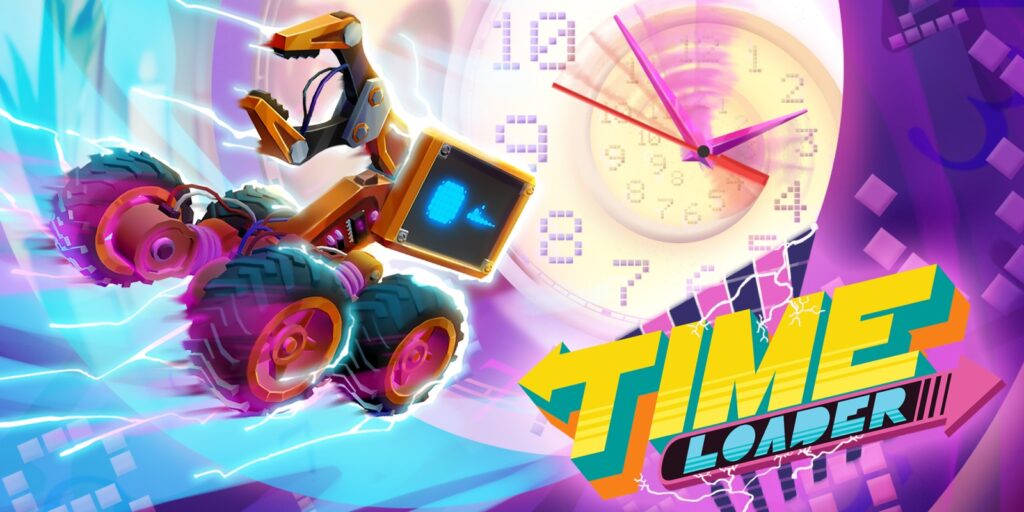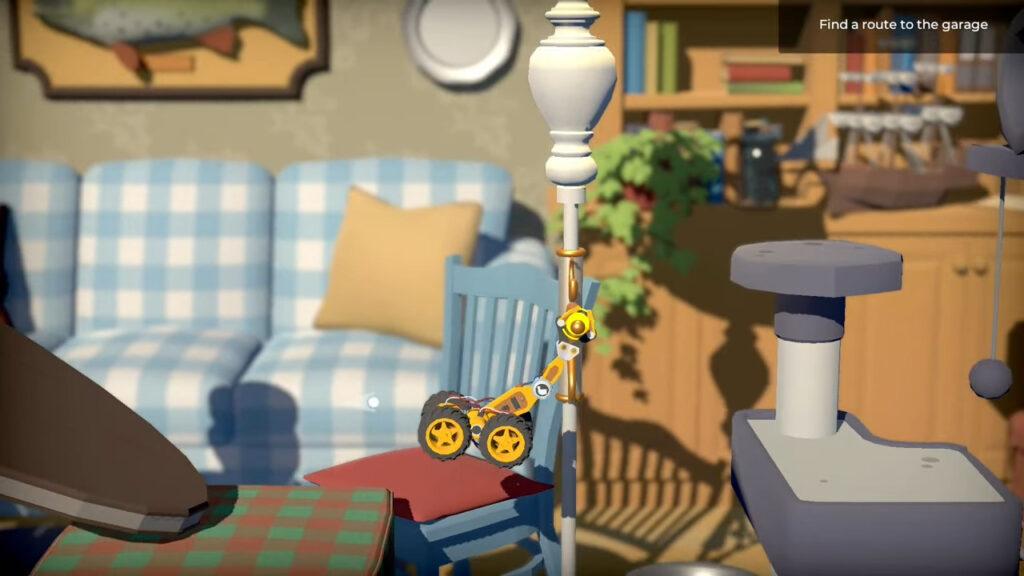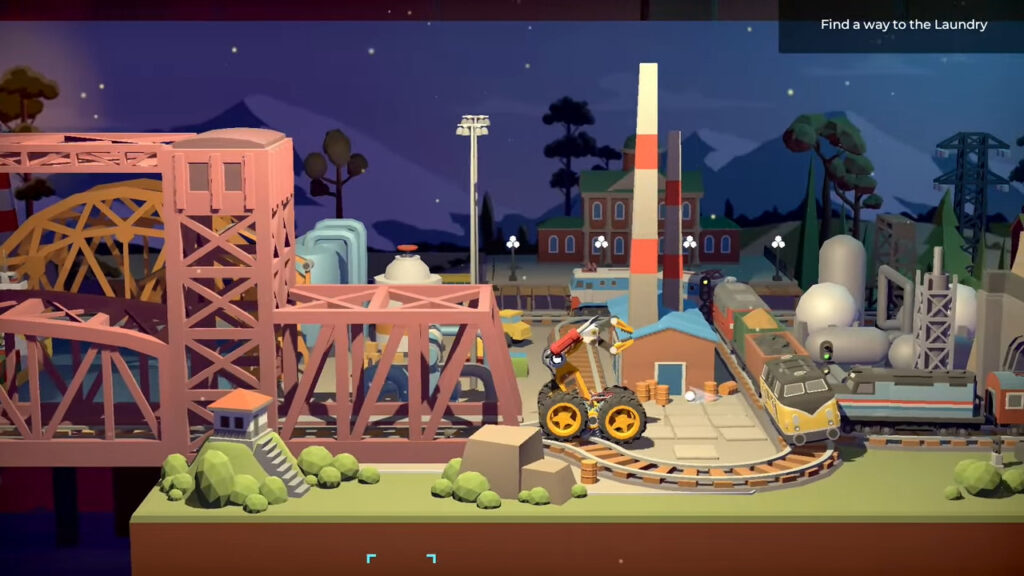
Developer: Flazm
Publisher: META Publishing
Platform: PC, PS4, PS5, Xbox One, Xbox Series X|S, Switch
Tested on: Switch
Time Loader – Review
The concept of time travel is commonly used in fiction, to the point that we often feel like there isn’t anything new that can be done with it. As such, we were skeptical when we first heard about Time Loader, a physics-based puzzle platformer that plays with the idea of sending a robot back to the ‘90s to alter the future of its disabled creator. It’s certainly a different vibe than something like Terminator, but will a smaller, more personal story be enough to make Time Loader worth it, or is this a game not worth wasting your time with?
Story
In the gorgeous opening cutscene, we meet Adam, who is not only our narrator, but also the catalyst of Time Loader’s story. In an emotional monologue, Adam recalls how as a child, he fell out of his treehouse. This tragic accident left him in a wheelchair. Now an adult, Adam grew up to be a brilliant scientist, who figured out a way to travel through time using a device that looks suspiciously like a microwave oven. Adam’s goal is to send a remote-controlled robot back to his childhood years, in order to prevent the accident from happening. As you’d expect though, messing with the timeline can lead to unintended consequences….
There is a surprisingly deep emotional load behind Time Loader’s narrative, and we won’t delve any further into the story in order to avoid spoilers. Rest assured though, it lingered with us even after the credits rolled, which is something we didn’t quite expect from a physics-based puzzle game. The game also has multiple endings, and given how well everything is written, it’s likely that you’ll want to revisit the game several times in order to get the complete picture of Adam’s emotional journey, with each ending offering more insight into his persona.
Graphics
Right off the bat, Time Loader sets a high bar with a flashback scene filled with stunning watercolor artwork. This is juxtaposed against the actual in-game visuals, which take on a more realistic, yet still cartoony form. We weren’t a fan of the in-game human models, which looked a little too unrealistic given the gravitas of the narrative, but these only appear very rarely in the game. The robot that players take control of looks very cute, something which is aided by the LED screen that shows his expressions. Also of note is that the game is set in the ‘90s for the most part -which makes sense, given that the robot travels back to 1995- and that there are tons of references to popular culture from this era to be discovered in the background, from Back to the Future’s DeLorean to a SNES. If you’re a ‘90s kid yourself, you’ll probably find yourself wanting to track down all of these.
Sound
While Time Loader tries to push the ‘90s references visually, the game’s OST doesn’t adhere to the same mindset. This would’ve been a great opportunity to load up the soundtrack with tunes that sounded like they came straight from this era. We’re not talking about licensing actual tunes, as that would’ve been prohibitively expensive, but it would’ve been fantastic if the music at least sounded fitting to the era. Unfortunately, what’s present here sounds generic and soulless instead. There is some narration present, and the robot has a voice as well, but the voice acting doesn’t stand out either, leading to a disappointing soundscape overall. Given how great the writing is, it’s a letdown that Adam’s voice actor doesn’t really bring his lines to justice.
Gameplay
Given that Time Loader caught us off-guard with how deep and emotional the story was, you might expect there to be a couple of surprises to the gameplay as well, but it turns out that this aspect of the game is a lot more straightforward. While the puzzles themselves are certainly well crafted, there is somewhat of a dissonance between the serious narrative and the quirky and lighthearted physics-based puzzle gameplay. Players take control of Adam’s robot and navigate through environments filled with obstacles that need to be overcome in order to reach the end of an area. There is plenty of variety to be found in the way the robot interacts with the environment too, from having to scale walls to grappling and swinging across gaps and pushing objects around.
The robot gains new tools as you progress through the game as well, unlocking not only new means of travel, such as the grappling hook, but also additional elements to solve puzzles. The actual puzzles themselves are fantastic: while they often require players to think out of the box, they never feel ridiculously difficult, but even seasoned puzzle game veterans will find that Time Loader offers the occasional challenge. It’s often clear what you’ll need to do to reach your goal -especially since the puzzles tend to be confined to a single, smaller area- but it’s not always easy to figure out how to do it. A neat little detail here is that whatever obstacle you run into makes sense within the environment, and you’ll have to deal with everyday objects, such as potted plants or lamps, blocking your path rather than outlandish ones. Of note here is that it isn’t just inanimate objects that you have to deal with, but Adam’s pet cat as well.
As we mentioned in the story section of our review, there are multiple endings present here, which adds some replayability. This ties into the premise of the game, as you’re effectively messing with the timeline, and thus altering the events of the future. While we certainly appreciate the effort put into this aspect of Time Loader, as it incentivizes the player to go back and see in what other ways they can mess with Adam’s future, we did feel like this part of the game wasn’t fleshed out enough. There are only four endings available and Time Loader is a very short game in the first place. An initial playthrough will only take most people roughly two hours, and subsequent playthroughs will be even shorter as you’ll have already figured out how most of the puzzles work when you return to the game.
It’s an aspect of the game that we feel could have been explored perhaps a bit more. We would’ve loved to have seen the so-called butterfly effect in full swing, where the game branched out and changed depending on early game actions. As it stands though, there isn’t a whole lot that changes apart from the ending that you’re working towards. The result is that there is roughly four hours’ worth of content here, which makes Time Loader a tough sell given the €14.99 asking price. In this price bracket, Time Loader faces plenty of competition and we’re not sure whether the narrative and overall presentation are going to be enough to draw in the crowds if the gameplay can’t live up to what other puzzle titles in the same price range have to offer.
Conclusion
With a surprisingly gripping narrative, clever puzzles, and fantastic visuals, filled with ‘90s references, there is a lot to love about Time Loader. The game’s short length and mediocre soundscape prevent Time Loader from achieving true greatness, and the full price point feels a bit too high. If you can pick this one up with a discount though, Time Loader is certainly worth picking up.
Time Loader - Review,









No Comments